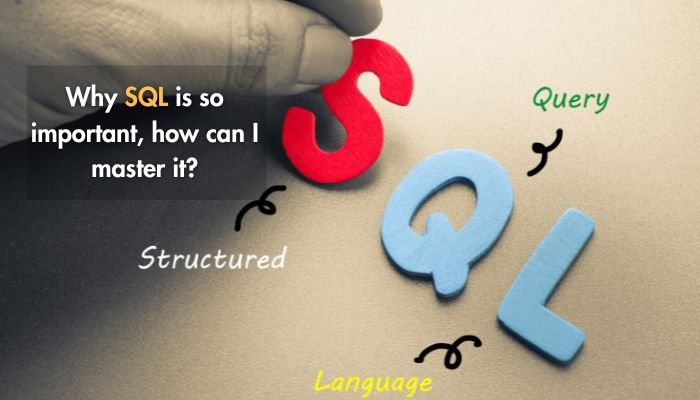Think of SQL as a universal translator for the massive libraries of data that businesses and organizations store. These libraries are called databases, and they hold everything from customer details to sales records. SQL allows you to:
- Ask Questions (Queries): Want to know the top-selling product last month? SQL helps you get that answer from the database.
- Add or Update Information: Need to add a new customer or change a product’s price? SQL lets you do that.
- Organize Data: SQL helps keep data tidy and easy to access.
- Data is Everywhere: We live in a data-driven world. Every click, purchase, or social media interaction generates data. SQL helps you unlock the insights hidden within this data.
- In-Demand Skill: SQL is a top skill sought after by employers across various industries, from finance and healthcare to marketing and tech.
- Data-Driven Decision Making: Companies rely on data to make informed decisions. SQL empowers you to analyze trends, identify patterns, and gain a competitive edge.
- Career Advancement: SQL skills can open doors to exciting career paths like data analyst, database administrator, business intelligence developer, and more.
- Problem-Solving: SQL trains you to think logically and break down complex problems into smaller, solvable tasks.
Mastering SQL: Your Beginner’s Guide
1. The Basics:
Databases: Understand that databases are like organized collections of information.
Tables: Inside databases are tables, which are like spreadsheets with rows and columns of data.
SQL Commands: Learn the essential SQL commands like…
- SELECT: Get data from a table.
- WHERE: Filter the data you get.
- INSERT: Add new data.
- UPDATE: Change existing data.
- DELETE: Remove data.
2. Hands-on Practice:
The best way to learn SQL is by doing. Here’s how:
Practice Databases: Many websites offer free practice databases where you can test out SQL commands. SQLZoo ( A Beginner’s Friend) Website:
- Codecademy (Beginner-Friendly)
- SQLFiddle (Intermediate)
- HackerRank (Intermediate to Advanced)
- LeetCode (Advanced)
- W3Schools SQL Tutorial (Beginner-Friendly)
- SQLBolt (Interactive)
- Mode Analytics (Advanced)
Top Coursera Courses to Master SQL
Coursera offers a variety of excellent courses to help you master SQL, from beginner to advanced levels:
Google Data Analytics Professional Certificate : Includes a comprehensive module on SQL for data analysis.
IBM Data Science Professional Certificate: Covers SQL for data science and other key skills.
Databases and SQL for Data Science with Python: Get hands-on with databases and learn to use SQL to extract insights from data using Python.
SQL: A Practical Introduction for Querying Databases: Master the essentials of SQL for interacting with databases and retrieving the data you need.
Learn SQL Basics for Data Science: Dive into the fundamentals of SQL and its role in data science, preparing you to analyze and interpret data effectively.
SQL for Data Science: Build a strong foundation in SQL, focusing on practical data analysis techniques for data science applications.
Introduction to Structured Query Language (SQL): Explore the core concepts of SQL and database design to understand how to structure and manipulate information.
Excel to MySQL: Analytic Techniques for Business Specialization: You’ll learn Business Communication, Big Data, Binary Classification, Data Analysis, Microsoft Excel, Business Analysis, SQL, Business Analytics, Tableau Software, Data Visualization, MySQL
Real-World Applications of SQL
SQL isn’t just for techies; it’s used in countless ways across different fields:
- Business: Analyzing sales data, tracking inventory, and managing customer information.
- Finance: Generating financial reports, risk assessment, fraud detection.
- Healthcare: Managing patient records, and analyzing clinical trial data.
- Marketing: Analyzing campaign performance, segmenting customers, and personalizing experiences.
- E-commerce: Tracking orders, recommending products, optimizing pricing.
- Social Media: Analyzing user behavior, understanding trends, and targeted advertising.
3. The SQL Mindset:
Learning SQL is not just about memorizing commands; it’s about thinking in terms of data.
- Think in Tables: Visualize how data is organized into tables and columns.
- Think in Queries: Start thinking about the questions you want to ask your data and how to phrase them in SQL.
- Practice Problem-Solving: Use SQL to tackle real-world data challenges.
Your SQL Journey
Remember, learning SQL is a journey. Don’t get discouraged by the learning curve. Here’s a roadmap to help you progress:
- Beginner: Learn the basic commands and practice on small datasets.
- Intermediate: Master more complex queries, joins (combining data from multiple tables), and data manipulation techniques.
- Advanced: Explore advanced SQL concepts like stored procedures, triggers, and database administration.
Key Tips for Mastering SQL
- Start with the Basics: Don’t rush. Build a strong foundation by understanding core concepts before moving on to advanced topics.
- Practice Regularly: Consistent practice is key to solidifying your skills. Dedicate time each day to write SQL queries and solve problems.
- Learn by Doing: Apply your knowledge by working on real-world projects or participating in online challenges.
- Don’t Be Afraid to Ask for Help: Reach out to online communities, forums, or mentors if you get stuck. The SQL community is incredibly supportive!
- Explore Different SQL Flavors: While the core SQL syntax remains the same, different database systems (like MySQL, PostgreSQL, Oracle) have slight variations. Experiment and learn the nuances of each.






